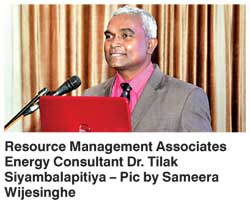Sunday Feb 15, 2026
Sunday Feb 15, 2026
Tuesday, 7 June 2016 00:07 - - {{hitsCtrl.values.hits}}
By Shehana Dain
A top energy consultant has called on regulators to move away from the short-sighted policy-making culture at “cocktail parties,” to learn lessons from the recent island-wide blackouts and give research topmost priority in policymaking.
“Today most of our politicians come up with policy decisions at cocktail parties and everyone knows thereafter how successful the practical implementations of these decisions are. We need to change this and it’s vital to get into a decision-making culture where research has a significant part,” said Resource Management Associates Energy Consultant Dr. Tilak Siyambalapitiya.
The energy consultant, who was delivering the keynote speech at the inaugural Research Symposium for Transport and Logistics (R4TL), stressed that industry in Sri Lanka was in dire need of Research and Development (R&D) to boost performance.
Taking a cue from the recent three islandwide blackouts, he emphasised: “The easiest way out was to blame it on sabotage; that was the quick response given and still we’re going around that theory. Could this have been stopped? Definitely yes, research would have brought the situation to light; remedial measures could have been implemented in advance.”
He added that when crisis struck, operators did not have online information and the situation was similar to ‘a blindfolded person driving a car’ which was predominantly caused by delays in projects to provide information.
According to Dr. Siyambalapitiya, currently the Government primarily relies on foreign-aided research programs and maintains the attitude that research is a job for the universities.
“The Government thinks that we don’t need research and these findings cannot be implemented, while the private industry says that they don’t have funds or the time to conduct research. Everyone tries to back out from this. Ultimately no one does it and without it investments go wrong.”
It was also observed that even though the Government had given an attractive tax credit for companies to take on R&D projects, no progress in this regard has been made due to a lack of communication to the private industry.
“Much of research requires only small amounts of funds; what is required is enthusiasm, dedication, recognition,” he added.
The first-ever R4TL symposium was organised by the Sri Lankan Society of Transport and Logistics (SLSTL) in association with Chartered Institute of Logistics and Transport (CILT) in partnership with Walkers CML. The symposium was held aiming to foster more research among the transport and logistics fraternity.
In the backdrop of the Government’s decision to reduce tax on electric cars, Resource Management Associates Energy Consultant Dr. Tilak Siyambalapitiya told Daily FT that this could trigger energy off-peak problems due to vehicle charging.
However, he noted that there was no need to be alarmed over national level grid failures as it could accommodate up to one million electric cars for now and that there were only around 5,000 electric cars in the market currently.
Prices of electric vehicles are slated to increase according to battery capacity while the Customs duty on electric vehicles with battery capacity of 100KW has been reduced. As such the Customs duty of Rs. 2.9 million on a Nissan Leaf electric vehicle will be reduced to Rs.1.7 million.
“There is off-peak capacity in the power generating system which can conveniently support about one million electric vehicles charging at any given time right now. As the demand grows, it would grow in the same proportion. However, when it comes to distribution level, if too many households along the street connect electric cars at the same time, there could be problems in the local distribution level.”
He observed that if 20 of these cars were in the same street, the electricity supply was not designed to cater to that level of simultaneous large consumption and could overload the local transformer.
“This has to be examined to a certain level via coordination of charging times and can be resolved to some extent. At the local level there has to be some kind of coordination done by the electricity supplier to make sure that the local transformer does not get overloaded,” he stressed.
When asked about the much-debated decision by the Government to go for another coal power plant and its practicality, he said that the best option at the moment was to work in parallel with both resources.
“It’s not a case of A, B, C or D, by which I mean coal, gas, wind or solar. It’s the entire electric power system; it has to work together. For the base, the cheapest technology as of now is coal, and then of course gas is almost approaching the cost of coal due to the surplus supply. Therefore 10 years ago if you asked me I would say gas is double the cost of coal, today it’s just over 10% more expensive. Most countries in the region are using both these resources for their base requirement. India and even Bangladesh are developing both, Sri Lanka for now has only gone for coal at the moment, so it may be right to think of gas as a parallel development not a case of this versus that,” he added.
He advocated that the key outtake was to look at it as a system. “It’s not question of this or that, it’s a combination of everything. That is why you need professional thinking and research.”